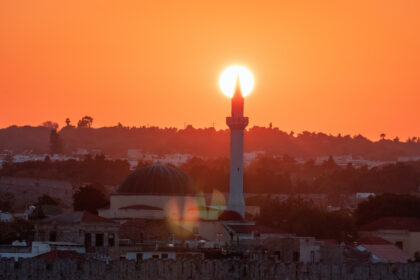As the first anniversary of the Hamas attacks on 7 October approaches, the British Muslim community finds itself facing a pivotal moment. The Western response to Gaza, particularly the reluctance of political leaders to call for a ceasefire, has left many British Muslims grappling with questions of identity and political belonging. This response has led to a surge in Islamophobia and a deepening of the divide between British foreign policy and the values of many Muslims.
Support for Palestinians and Political Disillusionment
The British Muslim community has long supported the cause of Palestinian self-determination. However, as the Gaza conflict continues to escalate, many Muslims have become increasingly disillusioned with the lack of political action in the UK. Community leaders have described the failure of politicians to push for a ceasefire as a betrayal, exacerbating feelings of marginalization.
Haniya Adam, a media consultant working closely with Muslim organisations, emphasized how the political inaction has deeply affected the community. “It shocked us to our core,” she said, adding that many feel that the reluctance to vote for a ceasefire reflects the inhumane treatment of Muslims.
Rise in Islamophobia
The Islamophobia Response Unit (IRU) has reported a dramatic increase in hate crimes against Muslims since the 7 October attacks. According to the IRU, Islamophobic attacks rose by 300% in the weeks following the attacks, with a further 400% increase in the run-up to the Southport riots. The surge in hate crimes has been particularly prevalent in schools and workplaces, where Muslims have faced discrimination for expressing their political views, such as supporting Palestine.
Majid Iqbal, chief executive of the IRU, highlighted how the conflict has been closely tied to an increase in Islamophobic incidents. “Palestinian and Muslim often go hand in hand,” he explained, pointing out that Muslims are frequently branded as terrorists or supporters of Hamas simply for expressing solidarity with Palestine.
Political Identity Crisis
The ongoing conflict has sparked a broader identity crisis for British Muslims. Many have expressed frustration with British foreign policy, which they feel does not represent their values. This frustration has led to resignations within the Labour Party, as councillors and MPs have stepped down over the party’s refusal to support a ceasefire.
Afrasiab Anwar, leader of Burnley council, is one of the individuals who left the party, citing a conflict of values. “It’s our moral responsibility to continue to speak up,” he stated, even in the face of personal and professional attacks.
Mental Health Impact
The Gaza conflict has had a profound impact on the mental health of UK Muslims. Ms. Adam noted that the community is experiencing heightened levels of anxiety and depression due to the ongoing violence and the lack of political response. Many feel powerless to help, leading to a sense of disillusionment and frustration.
Islamophobia in Schools and Workplaces
One of the most troubling aspects of the Islamophobia surge is its prevalence in educational institutions and workplaces. Muslims who have shown support for Palestine by wearing badges or posting on social media have been disciplined, with some even losing their jobs. There have also been cases where teachers have referred students to the UK’s counter-terrorism unit, Prevent, for expressing pro-Palestinian views.
Majid Iqbal explained that many of these incidents are tied to Islamophobia, as the lines between political belief and religious identity have become blurred. “We deal with cases where someone has been targeted purely because they are Muslim,” he said, highlighting how closely linked the issues of Palestine and Islamophobia have become.
Media Representation and its Impact
Extensive media coverage of the Gaza conflict has played a significant role in shaping public opinion and, in turn, fuelling Islamophobia. The graphic images of the war broadcasted daily have contributed to the rise in hate crimes, according to the IRU. The portrayal of Muslims in the media, often linked with terrorism, has further exacerbated the issue.
A Reckoning for British Muslims
The Western response to Gaza, or the lack thereof, has left British Muslims at a crossroads. Many now feel a growing disconnection between their identity and British foreign policy. For some, this has led to a deepening of their faith, while for others, it has caused them to question the UK’s commitment to justice and equality.
This moment of reckoning has also led to a surge in protests, with many non-Muslims joining the cause. Ms. Adam recalled that in the past, such protests were primarily attended by Muslims, but today, people from all walks of life are taking part, signaling a broader shift in public consciousness regarding the Gaza conflict.
In conclusion, the Western response to Gaza has ignited a profound identity crisis for UK Muslims, with the conflict highlighting the tension between their values and British foreign policy. As the Muslim community grapples with these challenges, it is clear that this moment of reckoning will shape the future of political and social dynamics for years to come.






